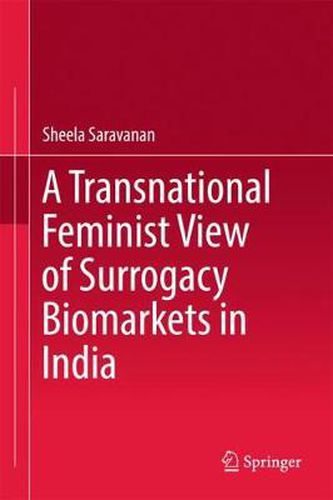Readings Newsletter
Become a Readings Member to make your shopping experience even easier.
Sign in or sign up for free!
You’re not far away from qualifying for FREE standard shipping within Australia
You’ve qualified for FREE standard shipping within Australia
The cart is loading…






This title is printed to order. This book may have been self-published. If so, we cannot guarantee the quality of the content. In the main most books will have gone through the editing process however some may not. We therefore suggest that you be aware of this before ordering this book. If in doubt check either the author or publisher’s details as we are unable to accept any returns unless they are faulty. Please contact us if you have any questions.
This book takes a reproductive justice approach to argue that surrogacy as practised in the contemporary neoliberal biomarkets crosses the humanitarian thresholds of feminism. Drawing on her ethnographic work with surrogate mothers, intended parents and medical practitioners in India, the author shows the dark connections between poverty, gender, human rights violations and indignity in the surrogacy market. In a developing country like India, bio-technologies therefore create reproductive objects of certain female bodies while promoting an image of reproductive liberation for others. India is a classic example for how far these biomarkets can exploit vulnerabilities for individual requirements in the garb of reproductive liberty. This critical book refers to a range of liberal, radical and postcolonial feminist frameworks on surrogacy, and questions the individual reproductive rights perspective as an approach to examine global surrogacy. It introduces ‘humanitarian feminism’ as an alternative concept to bridge feminist factions divided on contextual and ideological grounds. It hopes to build a global feminist solidarity drawing on a ‘reproductive justice’ approach by recognizing the histories of race, class, gender, sexuality, ability, age and immigration oppression in all communities. This work is of interest to researchers and students of medical sociology and anthropology, gender studies, bioethics, and development studies.
$9.00 standard shipping within Australia
FREE standard shipping within Australia for orders over $100.00
Express & International shipping calculated at checkout
This title is printed to order. This book may have been self-published. If so, we cannot guarantee the quality of the content. In the main most books will have gone through the editing process however some may not. We therefore suggest that you be aware of this before ordering this book. If in doubt check either the author or publisher’s details as we are unable to accept any returns unless they are faulty. Please contact us if you have any questions.
This book takes a reproductive justice approach to argue that surrogacy as practised in the contemporary neoliberal biomarkets crosses the humanitarian thresholds of feminism. Drawing on her ethnographic work with surrogate mothers, intended parents and medical practitioners in India, the author shows the dark connections between poverty, gender, human rights violations and indignity in the surrogacy market. In a developing country like India, bio-technologies therefore create reproductive objects of certain female bodies while promoting an image of reproductive liberation for others. India is a classic example for how far these biomarkets can exploit vulnerabilities for individual requirements in the garb of reproductive liberty. This critical book refers to a range of liberal, radical and postcolonial feminist frameworks on surrogacy, and questions the individual reproductive rights perspective as an approach to examine global surrogacy. It introduces ‘humanitarian feminism’ as an alternative concept to bridge feminist factions divided on contextual and ideological grounds. It hopes to build a global feminist solidarity drawing on a ‘reproductive justice’ approach by recognizing the histories of race, class, gender, sexuality, ability, age and immigration oppression in all communities. This work is of interest to researchers and students of medical sociology and anthropology, gender studies, bioethics, and development studies.